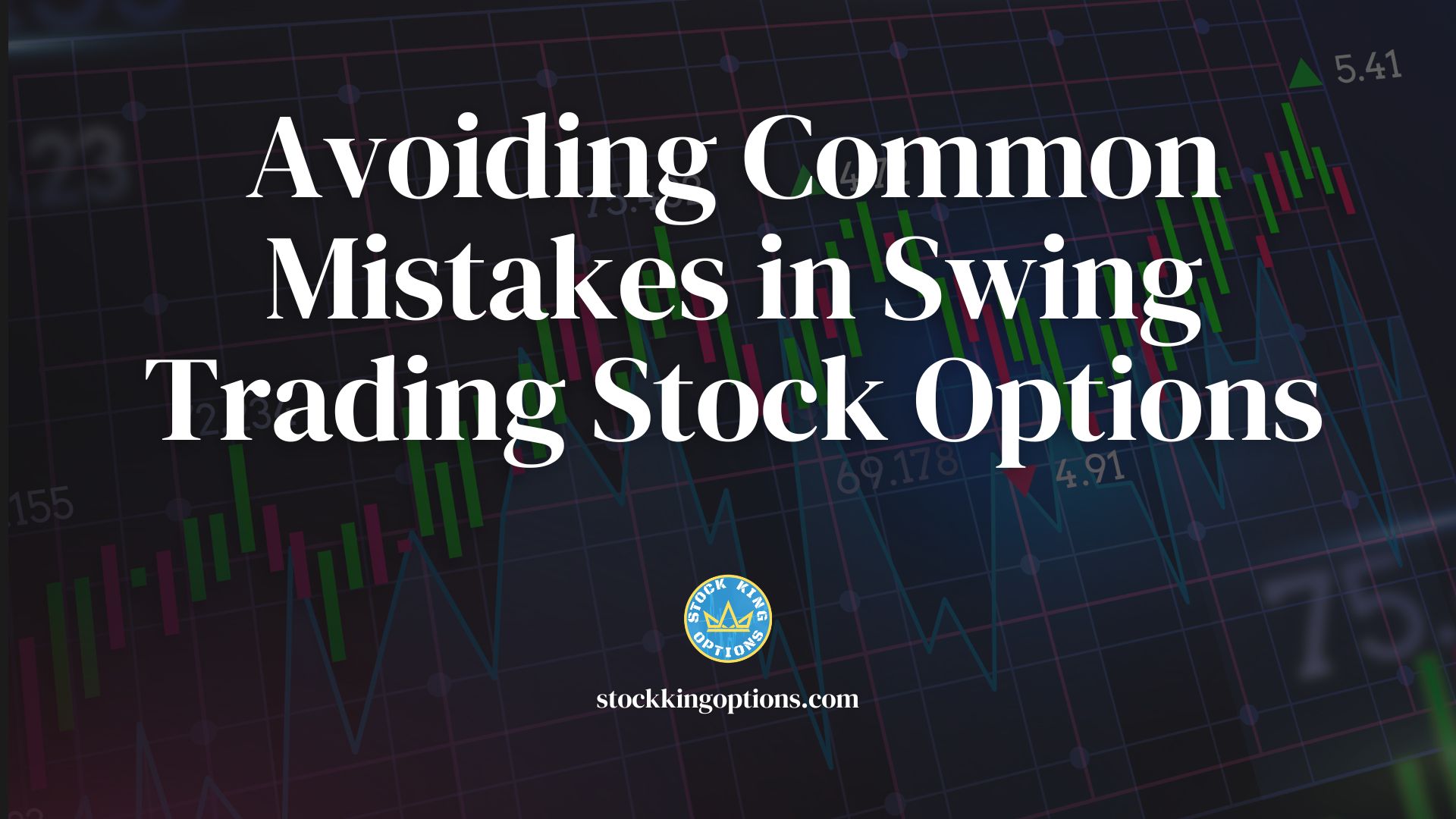
Key Takeaways:
– Recognizing and avoiding common mistakes is essential for success in options swing trading.
– Learning from the mistakes of others can help traders navigate the market more effectively.
– By avoiding common pitfalls, traders can improve their profitability and minimize losses.
Featured Snippet:
Question: What are some common mistakes to avoid in swing trading options?
Answer: Avoiding common mistakes in swing trading options is crucial for success. Learning from the experiences of others and implementing strategies to sidestep these errors can significantly improve trading outcomes.
Introduction:
In the world of swing trading options, steering clear of common mistakes is paramount to achieving success. This article delves into the most prevalent pitfalls encountered by traders and provides actionable insights on how to avoid them. By understanding these missteps and implementing preventive measures, traders can enhance their decision-making, preserve capital, and ultimately achieve their financial goals in the dynamic options market.
Overtrading
Overtrading is a common mistake that many swing traders make when trading stock options. It is often seen as a way to maximize profits and take advantage of every opportunity in the market. However, overtrading can ultimately lead to significant losses and should be avoided at all costs.
The first thing to understand about overtrading is that it goes against the fundamental principle of risk management. Every trade comes with an inherent level of risk, and by overtrading, traders are increasing their exposure to these risks. This means that even if some of the trades are successful, the overall impact on the portfolio can still be negative.
Another issue with overtrading is that it can lead to emotional decision-making. The pressure to constantly enter new trades and keep up with market movements can cause traders to act impulsively without properly analyzing the potential risks and rewards involved in each trade. This can result in hasty decisions based on emotions rather than sound analysis, which rarely leads to profitable outcomes.
Moreover, overtrading also increases transaction costs, such as commissions and fees, which can eat into profits significantly. As a swing trader with limited capital, it is crucial to consider these costs before entering multiple trades within a short period.
To avoid falling into the trap of overtrading, it’s essential for swing traders to have a clear trading plan in place. This includes setting specific entry and exit points for each trade based on technical indicators or fundamental analysis. By sticking to this plan and avoiding impulsive decisions, traders can avoid getting caught up in reckless trading behavior.
Furthermore, keeping track of one’s trading activity through journaling or using trading platforms with data analytics capabilities can be beneficial in identifying patterns of overtrading. Traders should analyze their performance regularly and reflect on whether they are meeting their targets while adhering to their planned number of trades per day or week.
While it may seem tempting for swing traders to overtrade and try to capitalize on every opportunity in the market, it is a dangerous mistake that should be avoided. Instead, traders should focus on careful risk management and sticking to their trading plan to achieve long-term success in swing trading stock options. Remember, quality over quantity is the key to successful trading.
Ignoring Risk Management
Ignoring risk management is one of the most common mistakes made by swing traders when trading stock options. While it may seem tempting to jump into a trade without fully assessing the potential risks involved, doing so can have detrimental effects on your portfolio and ultimately lead to significant losses.
One of the main reasons why traders ignore risk management is due to their overconfidence in their abilities or the belief that they have found a surefire way to make profits. However, it’s important to remember that no trade is ever certain and there will always be an element of risk involved. Ignoring this fact can result in impulsive and reckless decision making, which can lead to severe financial repercussions.
Another reason for disregarding risk management is the fear of missing out on potential gains. In swing trading, where trades are held for a shorter period of time compared to long-term investing, there can be a tendency to take on greater risks in pursuit of quick profits. This can be especially dangerous when combined with FOMO (fear of missing out) as traders may jump into highly speculative trades without thoroughly considering the associated risks.
Additionally, some novice traders may not fully understand or appreciate the importance of risk management in swing trading. They may not realize that managing and minimizing risks can actually increase profitability in the long run. By carefully considering factors such as position sizing, stop-loss orders, and diversification, traders can protect themselves from catastrophic losses while also maximizing their potential returns.
So how exactly does ignoring risk management affect swing trading? Firstly, it increases the likelihood of substantial financial losses. Without proper risk assessments and measures in place, even one wrong move or market fluctuation could wipe out a significant portion of your portfolio.
In addition to financial losses, ignoring risk management also leads to emotional stress and constantly being on edge while monitoring trades. This added pressure can negatively impact decision-making abilities and cloud judgment.
Moreover, consistently ignoring risk management practices creates a dangerous cycle of excessive risk-taking, where traders may become desensitized to risk and continue making impulsive decisions. This can have a domino effect on their trading portfolio and potentially lead to even more significant losses in the future.
Ignoring risk management is a common mistake made by swing traders that should be avoided at all costs. It not only increases the potential for major financial losses but also creates a negative psychological impact that can harm the success of your trading career. Therefore, it’s crucial for traders to educate themselves about proper risk management techniques and incorporate them into their trading strategies to avoid falling victim to this costly mistake.
Chasing Losses
Chasing losses is a common mistake that many swing traders make, and it can have serious consequences on their overall profitability. This refers to the tendency of traders to continue trading in an attempt to recoup any previous losses they may have experienced. However, instead of making up for these losses, this behavior often leads to even more losses and can quickly spiral out of control.
One reason why chasing losses is such a dangerous mistake is because it is driven by emotion rather than sound strategy. When traders experience a loss, they may become anxious or frustrated and feel the need to immediately make up for it. This emotional response can cloud their judgment and cause them to make impulsive trades without proper analysis or risk management.
Another problem with chasing losses is that it can lead to overtrading. In an effort to recover what was lost, traders may enter into too many trades without considering the potential risks involved. This not only puts them at a higher risk of losing more money, but also results in poor trade selection as they are no longer following their original trading plan.
In some cases, chasing losses can also lead to revenge trading – where traders aim to punish the market for causing them a loss. They may take on higher-risk trades or put all their savings into one trade in hopes of turning things around quickly. Unfortunately, this approach almost always backfires and results in even greater losses.
To avoid making this costly mistake in swing trading stock options, it is important for traders to learn how to manage their emotions when faced with a loss. This means staying disciplined and sticking to your predetermined trading plan rather than giving in to impulses.
It’s also crucial for traders to know when it’s time to cut your losses instead of holding onto losing positions hoping for a turnaround. Having stop-loss orders in place can help limit potential damage from a single trade gone wrong.
Additionally, having realistic expectations about profits and acknowledging that inevitable small setbacks are part of the trading journey can help reduce the temptation to chase losses.
Chasing losses is a common mistake that traders should strive to avoid. It not only leads to further losses but also jeopardizes their overall success in swing trading stock options. By managing emotions, following a disciplined approach, and knowing when to cut your losses, traders can increase their chances of long-term profitability.




